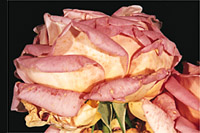Three remarkable reference books are available to individuals
who might have an interest in fungi or who would like to introduce microbiology into their biology curriculum. The books are not new, but they remain current and are highly informative and readable to the nonspecialist.
Plant Diseases: Their Biology and Social Impact, written by Dr. G. Schumann of the University of Massachusetts, introduces the world of microbiology to the average person through the eyes of a specialist in plant pathology. The book traces the Irish Potato Famine into the science of plant pathology. It also discusses the role of fungi as pathogens of crops and their role and impact in the soil, rhizosphere, and to our food supply. The book has a valuable glossary that helps to explain the terminology used throughout the text. The book was published in 1991 by the American Phytopathological Society and can be ordered online.
Magical Mushrooms, Mischievous Molds is written by Dr. G. W. Hudler of Cornell University and was published by Princeton University Press in 1998. The book is a very well written with informative text describing the remarkable story of the fungus kingdom and its impacts on human affairs. The books discuss fungi as pathogens of food crops, trees and humans. It also discusses the use of fungi as sources of medicines and in the baking and brewing industries. A third book, In the Company of Mushrooms, was written by Dr. Elio Schaechter of Tufts University and was published by Harvard University Press. It describes the adventures of distinguished biologist who enjoys mushrooms as a hobby.
The books written by Hudler and Schaechter were the basis for a discussion with the authors on National Public Radio (www.npr.org) on November 26, 1999 on a segment of "Talk to the Nation. The 46-minute discussion is still available online in NPR's archives of "Talk to the Nation."
 |
Views: Botrytis blight of rose is a fungal disease of the bud and twig that may appear in wet weather. The symptoms of the disease on a flower are shown above. Quickly remove infected flowers and flowers that have finished blooming to help prevent spread of the fungus. Click image for an enlarged view and more information |
